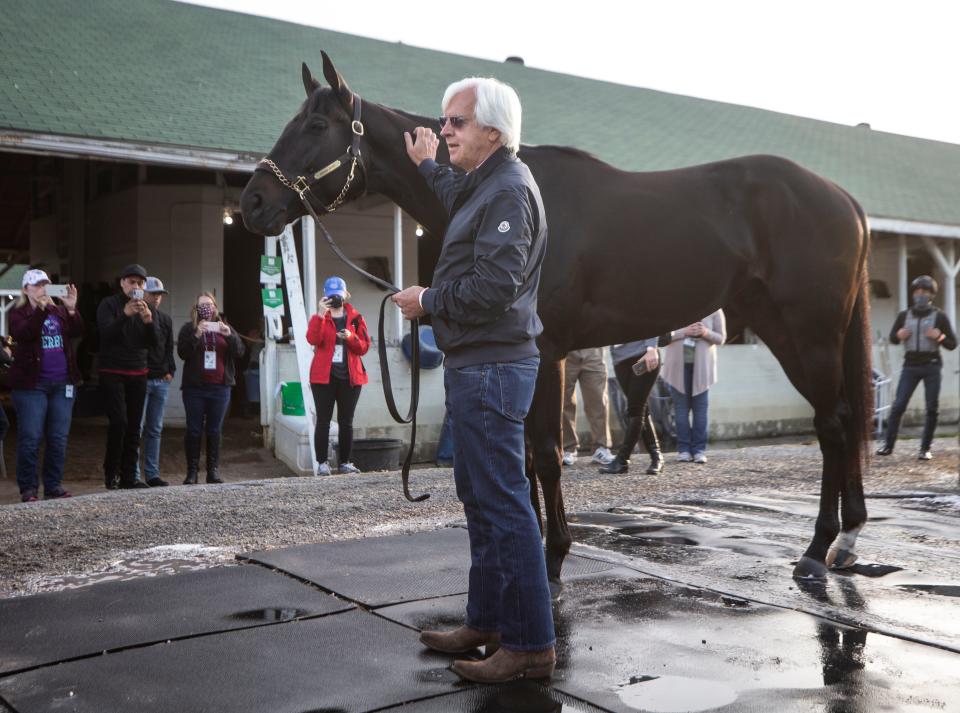While awaiting Medina Spirit's sample test, decision on Kentucky Derby win at impasse
Medina Spirit’s split sample has not yet been tested. As late as Tuesday, it had not yet been moved from the backside test barn at Churchill Downs.
Consequently, the 147th Kentucky Derby remains no closer to resolution than it did when the winner tested positive for betamethasone nearly two weeks ago. Medina Spirit still stands to be disqualified, but probably not anytime soon.
Though Churchill Downs and the New York Racing Association (NYRA) have summarily suspended trainer Bob Baffert for the restricted medication found in blood drawn from Medina Spirit on Derby Day, the Kentucky Horse Racing Commission (KHRC) regards a positive test as an unproven allegation until its findings can be confirmed through testing of a second sample.
That process can take weeks, even months, but it has slowed to a standstill since Baffert was notified of the presence of 21 picograms of betamethasone in Medina Spirit’s initial test.
More: Pour Medina Spirit's positive test 'down the sink?' Horsemen react to Baffert controversy
Dr. Mary Scollay, executive director of the Racing Medication and Testing Consortium (RMTC), suspects at least some of the delay is probably deliberate on Baffert’s end.
“I imagine the initial strategy was, ‘Let’s see if we can drag our feet so that the split isn’t back before the Belmont,’ thinking that NYRA would be less willing to issue a suspension if it weren’t a fully confirmed finding in Kentucky,” Scollay said on Wednesday. “But since that’s not how (NYRA) moved, I don’t know how that impacts the urgency or lack thereof in running the split.”

KHRC regulations require state stewards to notify the owner and trainer within five business days of being notified of a positive test by a commission laboratory. Those connections then have three business days to request that a split sample be tested.
But in the absence of a specified time limit governing its selection of an accredited lab, a trainer or owner can prolong the process indefinitely.
“He can drag his feet and all the stewards can do is exhort him to please select a laboratory so the split can go out,” Scollay said. “But there’s no rule that says if you don’t select a lab within five business days you waive your right to the split or the commission can select from the approved laboratories. There’s no provision for that.”
Efforts to close that loophole are likely to lead to a new regulation — to be known, at least informally, as the “Baffert Rule.” Yet what regulators perceive as strategic foot-dragging Baffert’s end is simply due diligence according to the trainer’s attorney.
"No delays. No roadblocks,” Craig Robertson said via email. “Given the importance of the matter everyone is rightfully proceeding carefully and thoughtfully to make sure everything is done right."
Given Robertson’s recent success in persuading the Arkansas Racing Commission to rescind Baffert’s 15-day suspension and restore two of his victories at Oaklawn, the KHRC can expect to be challenged on any irregularities in its procedures. Though split samples almost invariably confirm the results of primary tests — and did in the Arkansas case — Robertson was able to exploit errors in record-keeping and chain of custody questions to Baffert’s benefit.
The actual split sample testing should not take more than a week. The difficulty lies in getting to the front of the line. Though resolving the Kentucky Derby could command high priority in some places, testing labs generally prefer not to know which horse’s sample is being tested to prevent any appearance of bias. Scollay suspects some labs might want to avoid Medina Spirit’s sample because of the inconvenience and expense of potential litigation.
Sullivan: Medina Spirit's defeat at Preakness moves racing's drama out of sight
Some labs, committed to servicing their year-round clients, may not be able to offer the same turnaround time for one-shot testing. The results of Baffert’s Arkansas split samples were announced 65 days after the races were run.
“The split sample laboratory has to agree to accept the split sample,” said Dr. Scott Stanley, a professor at the University of Kentucky’s Gluck Equine Research Center. “And often times, in the spring and summer, the laboratories are busy. If they can’t provide the turnaround time or they don’t have the bandwidth to accept the sample, they can decline it.
“In some cases, if all the labs decline to do the split sample, the racing commission would have to contact one and see if they can work it into their schedule. Those things take a while to coordinate.”
After Dr. Bruce Howard confirmed Medina Spirit’s split sample had not been shipped Tuesday morning, the KHRC moved into blackout mode. A spokesman said no further updates would be provided until the testing was complete.
Not that anyone’s interested in the outcome of the Kentucky Derby.
“I think there has to be a better way,” said former Breeders’ Cup CEO Craig Fravel. “I have some ideas that I’d like to discuss with the RMTC, (but) I don’t really want to throw ideas out there that haven’t been vetted. I do think there has to be a better way.”
Follow Tim Sullivan on Twitter: @TimSullivan714
This article originally appeared on Louisville Courier Journal: Kentucky Derby at standstill awaiting Medina Spirit split sample test

